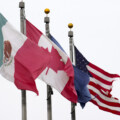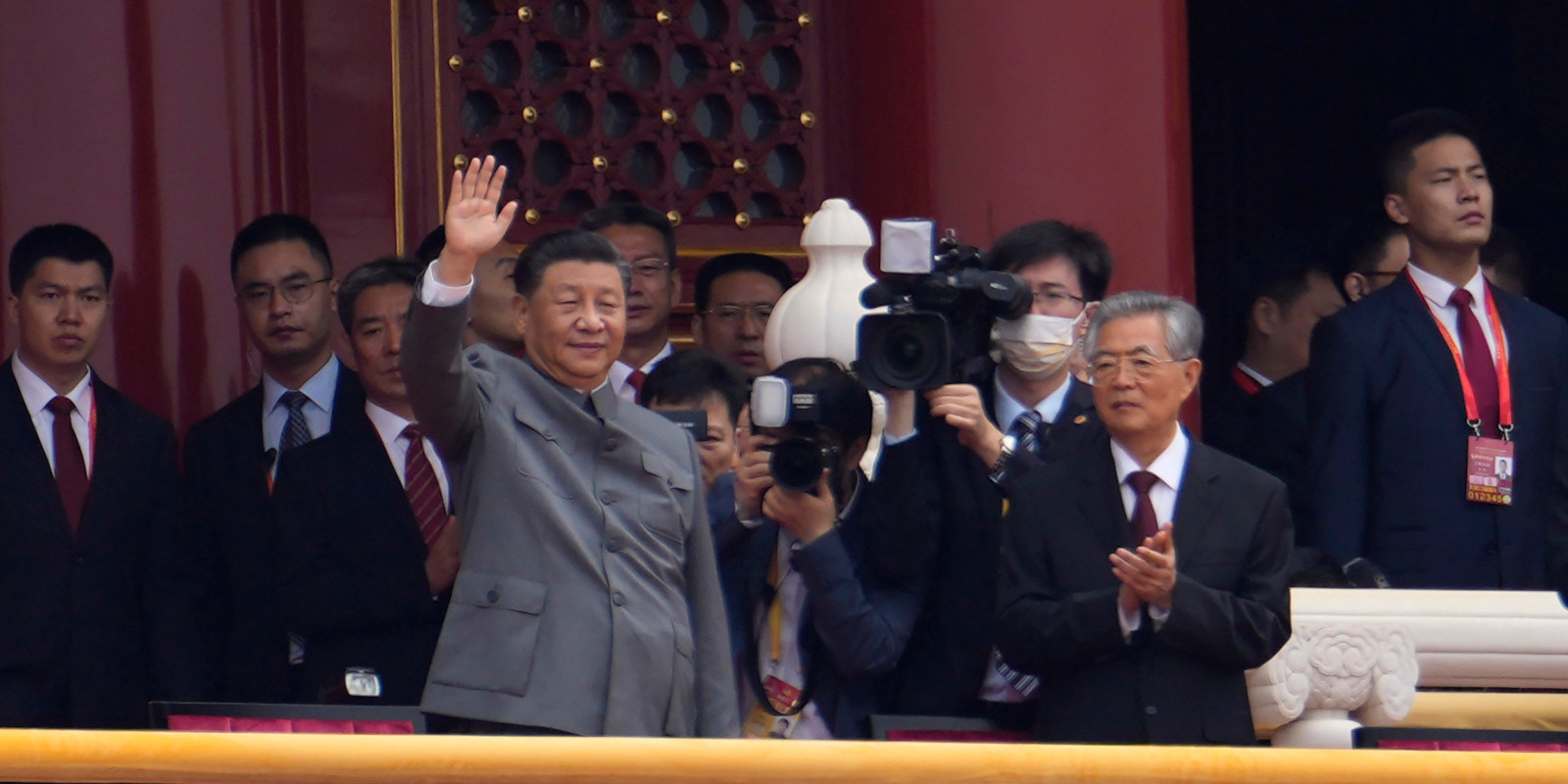Today’s Hub Dialogue is a conversation between The Hub’s executive director Rudyard Griffiths and noted Chinese scholar Zhang Weiwei. It took place on November 18, 2021, in Toronto at the Gardiner Museum in front of a live audience with Zhang Weiwei participating via video conference from Shanghai.
Professor Zhang Weiwei is the Dean of the China Institute at Fudan University, China’s elite post-secondary institution based in Shanghai. He is a former translator to Deng Xiaoping. Today he is a bestselling author, television host, and commentator in Chinese media. He recently briefed China’s Politburo on Chinese foreign policy and is regularly credited in the international press as an informal advisor to Xi Jinping.
Even where readers may disagree, the dialogue provides a unique window into the thinking of an important member of China’s intellectual establishment.
This conversation has been revised and edited for length and clarity.
RUDYARD GRIFFITHS: There’s a contention in the West, a vocal one, that China has become an authoritarian regime. This is something you’ve written and talked about extensively. You profoundly disagree with this assessment. Why?
ZHANG WEIWEI: Indeed. Describing China as authoritarian gives me the impression that these political scientists, media people, or politicians who say that are being slightly too lazy. They should actually spend time studying the Chinese case. If you look at the opinion surveys—almost without exception, whether it’s Pew, Ipsos, or Dahlia research—about how most Chinese feel about their country, roughly 90 percent, slightly above or slightly less, think their country is on the right track. This is not just for last year either. It’s for five to ten years running during which the range is consistently between 80 to 95 percent. This approval rating is among the highest in the world.
As a scholar, it’s a little bit lazy to claim that Chiang Kai-shek was an authoritarian, Chairman Mao was an authoritarian, Deng Xiaoping was an authoritarian, and the leaders today are authoritarians. There’s been just so many changes—such profound changes. They’re very different.
We should analyze China with slightly more sophistication and more respect. China is indeed a miracle. It’s remarkable. If you live in China, you will see the changes. There’s a fast pace to change, and most people feel these changes are on the whole more positive than negative. It has to do with the political system and the quality of leadership and the quality of decision-making.
So, I think the West should really move on. The political science that took shape in the United States since the Second World War can in many aspects be called a pseudoscience. As a result, one cannot predict China. These scholars have failed to predict the rise of China.
RUDYARD GRIFFITHS: Talk to us a little bit more about meritocracy, because it’s something you write a lot about in your book The China Wave: Rise of a Civilization State. You believe that this is deeply entrenched in Chinese culture and Chinese society, and it leads you and other Chinese leaders to the conclusion that really the last thing the Chinese people want is some form of Western democracy. Is that correct?
ZHANG WEIWEI: Well basically, China thinks that as a leader of a country, you should have an important responsibility and you need certain qualifications. So, this is something from China’s long history. We have a saying, that if you want to be prime minister, you have to start as a county chief; if you want to be a general, you have to start with being a foot soldier. This is so deeply entrenched in Chinese culture and traditions.
If you look at China as a unique country, a civilizational state, in terms of population—forty times the size of Canada, or a hundred times the size of every European state, with European countries having roughly 14 million on average, while in China has 1.4 billion—in China’s long history, if you look at the size of population and relatively fewer resources, especially in per capita returns, there was fierce competition at all levels of Chinese society.
Somehow, this has evolved this tradition of meritocracy to select competent leaders through all kinds of examinations. Only the most competent can become prime minister or become ministers. This tradition is important. In other words, most Chinese expect someone with competence, someone with experience, with the kind of knowledge capable of governing a huge country like China. And he should be relatively neutral on the whole, so he can represent most people, rather than a certain group of people.
So, this holistic interest in mind is very much a Chinese idea. Obviously, the Chinese Communist Party in the eyes of most Chinese is a party with holistic interests (of the people in mind). I have called it a “holistic interest party.” In the Western political system, I call the Western political parties as “partial interest parties.” That’s a key difference. It’s a long tradition in China’s history and has since become more modernized.
The Chinese Communist Party in the eyes of most Chinese is a party with holistic interests.
RUDYARD GRIFFITHS: You know Graham Allison, and his thesis of the so-called “Thucydides trap”: the idea that an upcoming, rising power displacing a declining, dominant power leads, if you look at the historical record, to a high incidence of not only economic and diplomatic conflict but war.
What’s your feeling about this theory and its application to the relationship between China and the United States, which by all objective accounts, has worsened significantly?
ZHANG WEIWEI: Well, I had one or two rounds of discussions with Professor Graham Allison when he was in China. I said, “Yes, you have a point when you said 14 cases out of 16 cases ended up in wars between rising powers and declining powers. But all your cases are deep-rooted in Western culture, which is more or less about a zero-sum gain.” The West has a religious tradition where it’s more exclusive than inclusive. As George W. Bush said, “Either with us or against us.” This is not Chinese tradition. If I, again, describe China’s civilizational stage, we are very cautious on the use of force. If you read the Art of War by Sun Tzu, written over 2000 years ago, the first principle is war matters a lot, and one must be very cautious about war.
I remember Jimmy Carter told Donald Trump, “Why China is moving ahead of us? Because they are in peace; their money is put into development.” Looking at the United States, by contrast, over the past 242 years, there are only 16 years when the U.S. is not fighting a war. So, even though China did not fire a single shot over the past four decades, yet in the U.S. media, China is described as aggressive, and America is characterized as peace-loving. This is ridiculous.
I proposed that if you look at the Chinese civilizational state tradition, which is still there today, when China first exploded a nuclear device in 1964, China announced to the whole international community that “China will not be the first to use nuclear weapons. China will not use nuclear weapons against non-nuclear states. ” If all nuclear powers can do that, there’ll be no risk of nuclear wars. That’s just one example.
Given the size of the U.S. and China including their economic and military capability, why should we go back to the Cold War and its philosophy of mutually assured destruction or MAD? Instead, I have proposed on different occasions that we should have mutually assured prosperity or MAP. It’s much better than MAD.
If the United States is attacking China’s core interests and crossing the red line, I’m afraid there’ll be conflicts.
Yet, to be frank with you, China, having experienced indeed a century of humiliations, mainly by European powers from the British opium war to other wars, is focused a lot on building up its defense capability. Now, it’s very powerful, and it can defeat the United States if it involves itself in the intervention of Taiwan. This is something we have to be very open about. China will not launch a war against the United States, but if the United States is attacking China’s core interests and crossing the red line, I’m afraid there’ll be conflicts.
RUDYARD GRIFFITHS: That’s exactly where I want to go with you next: red lines. We’re all familiar with the red line of Taiwan, but it seems that there are other red lines emerging including economic red lines that seem to have the potential to, as you say, represent some material threat to China’s rise.
I wonder if you could just provide us with a bit more context as to how China’s leadership are thinking about these less visible red lines beyond Taiwan,
ZHANG WEIWEI: You may notice not long ago how the Chinese foreign minister talked with his counterpart in the United States, Secretary of State Blinken, where he basically drew three red lines. One is state sovereignty, which cannot be encroached upon. That has to do with Taiwan, Tibet, Xinjiang, and the Chinese islands in the South China Sea, etc. The other is that China’s political system cannot be challenged. Because the US had been sponsoring all kinds of, what we call, “colour revolutions,” which we think is in violation of China’s core interests. And the other is China’s right to development, the right to modernization.
Fortunately, I remember last year when we last talked, Huawei’s Meng Wanzhou was still in custody and now I’m glad she’s released. I hope that Canada and China can gradually improve their bilateral relations. I think this is a case of the right to development. Obviously, the United States wants to hinder or stop Huawei’s rise in 5G and other areas. We think it’s grossly unfair.
RUDYARD GRIFFITHS: A good segue to my next question. There’s a lot of talk now about this new doctrine that’s emerged in China in recent months of so-called “common prosperity.” What are your thoughts on why this has happened? Why is this a new governing principle and what are the consequences for how China functions?
Well, it’s more or less like this: If you look at my work The China Wave: Rise of a Civilizational State and other writings, I submitted a thesis that said, “If you compare political systems worldwide, you have to focus on the relations between political power, social power and the power of capital.” In the case of China on the whole, at least up to now, we have achieved a balance between these three powers in favor of the vast majority of Chinese people. That’s why the living standards of the Chinese people have increased more than twenty-fold over the past four decades.
In the United States, I’m sorry to say, this balance is overwhelmingly in favor of capital power: the power of the capital, the rich, and the super-rich. I have another saying, that in the case of China, the richest 100 individuals cannot dictate the political bureau. In the White House, in most cases, about 50 richest individuals can decide what the White House does. It’s a slight simplification, but the power of capital is way too strong in the United States. That will hurt the United States in the long-term – indeed it’s already hurting the U.S.’ long-term interests.
Now, concerning common prosperity, this is something that shows China’s range of long-term thinking. Chairman Deng Xiaoping raised this topic when China was still very poor. In the early 1980s, he said that we have to draw lessons from what he described as “extreme egalitarianism” that occurred during the cultural revolution that led people to not have any incentive to work. His answer was a two-part strategy. The first part is that some regions get prosperous first and then these prosperous regions will bring along other regions into common prosperity. That’s the first part.
The second part is that some people should be encouraged to become better off first and then helping others to get along and become better off, in this aspect we have also achieved positive results. For instance, last year, we eradicated extreme poverty nationwide, and we have already created the world’s largest middle class: over 400 million people, a real middle class. Even if they go to Canada or to the United States, they are middle class with private properties and decent incomes. So now, we want to focus on more growth of the middle-class. In my own analysis, by the year 2030 or a bit longer, China’s middle-class will be around 800 million. It is already larger than the U.S. population now. It will be twice larger than the U.S. population by then So, the implication (of all this) will be enormous for China and for the global scene.
In Chinese culture, the state is a necessary virtue.
I come to your point concerning the role of the state. As I said, the role of the state in China is viewed, in the eyes of most people, as more positive than negative. You don’t have this in the Anglo-Saxon world, where the state is a necessary evil. In Chinese culture the state is a necessary virtue. That has to do with the system of meritocracy. The Chinese meritocracy is not the American one, which is about the Harvard elite or Yale elite. That’s not Chinese. The Chinese elite or meritocracy means you have to work from the grassroots and then step-by-step, perform and get a top position. So, people have a lot of confidence in this leadership.
RUDYARD GRIFFITHS: Chairman Xi remains a bit of a mystery to a lot of Western audiences. It’s hard for us to get a sense of who he is and how he thinks. I know that you’ve spent time with him; you’ve talked about global affairs and foreign policy. I wonder if you could just share with us a little bit about who he is and how he thinks?
Well, my personal impression of President Xi is on the whole very positive. He’s obviously very competent, very knowledgeable, and very sophisticated, and he knows a lot about Chinese affairs and international affairs.
He started from very a humble status in the sense that he went to the countryside during the cultural revolution at the age of 16. While he comes from a family of first-generation communist leaders, his father was being persecuted and was in prison, and he was sent to the countryside at the age of 16, and spent six to seven years there. So, he understood the situation in China’s grassroots at that time.
He is one of the very few leaders in the world today, even in China, that worked at each level of the Chinese government. From the low level called the township, then the county, then the province, then the municipality, and then the central government. This experience has given him a lot of knowledge and experience.
One of his strengths as a good and competent leader, at least in the eyes of the Chinese, is his vision and ability to make tough decisions. I’ll give you an example. When COVID-19 broke out in Wuhan, and when Chinese scientists and doctors said it’s highly contagious, President Xi Jinping made a decision: the city of Wuhan must be blocked. That’s the only way. On January 23, 2020, it was blocked.
No one knew the consequences, but from the consultations with Chinese medical doctors and scientists, he saw that as the only solution, because it was on the eve of the Chinese Spring Festival – which was the following the day – which is like your Christmas. If that step were not taken, COVID-19 would have spread across China. Instead, it was confined to Wuhan and Hubei province. Then China could mobilize resources to handle the outbreak.
He said then, “That was my decision. There was no other choice. I take full responsibility for that.” Most Chinese admired this and respected this. He’s very popular among the Chinese population, not as a politician, but as a statesman.
RUDYARD GRIFFITHS: Well, Professor Zhang, you’ve been very generous with your time. I know you’re just getting your day started in China, some 13 hours ahead of us. We’ve really enjoyed our time with you. I know that you had wanted to come here in person to talk to us, but because of this thing called a pandemic, we were prevented from doing that. But let’s hope in the future that we can have the opportunity to host you here in Toronto. Thank you so much, Professor Zhang. Be well, and we’ll talk.
ZHANG WEIWEI: Thank you very much. I was hoping you were joining us in China. Thank you very much.
Recommended for You

Howard Anglin: Canada’s days of comfort are over

Sabrina Maddeaux: Careful, Conservatives. Don’t take younger voters for granted

Daniel Dufort: Canada’s destiny remains in North America

Malcolm Jolley: Whether it costs $20 or $200, wine has never been better—here’s why



